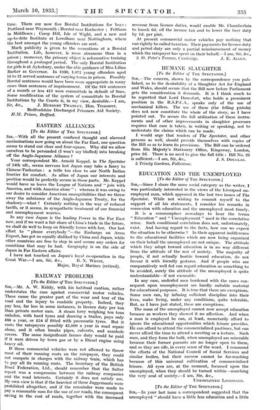EDUCATION AND THE UNEMPLOYED
[To the Editor of THE SPECTATOR.]
SIR,—Since I share the same social category as the writer, I was particularly interested in the views of the Liverpool un- employed man, which appeared in the last two issues of The Spectator. While not wishing to commit myself to the support of all his statements, I consider his remarks in connexion with education and the unemployed most timely.
It is a commonplace nowadays to hear the terms " Education " and " Unemployment " used in the correlative sense. Such conditional correlation does not, unfortunately, exist. And having regard to the facts, how can we expect the•situation to be otherwise ? In their apparent indifference to the educational facilities which are now being organized on their behalf the unemployed arc not unique. The attitude which they adopt toward education is in no way different from the attitude of the rest of society. The majority of people, if not actually hostile toward education, do not favour it with friendly gestures. And if people who are comparatively well fed can regard education as something to be avoided, surely the attitude of the unemployed is quite understandable—if not excusable.
In any case, underfed men burdened with the cares con- sequent upon unemployment are hardly suitable material for educational purposes. It is true that there are exceptions. Some men can, by infusing sufficient discipline into their lives, make living, under any conditions, quite tolerable. But, as I have just stated, these are exceptions.
The mass of the unemployed cannot now accept education because as workers they showed it no affection. And when a man is employed he can, at least, monetarily afford to ignore the educational opportunities which leisure provides. He can afford to attend the commercialized pastimes, but can never afford the time to attend a meeting or a lecture. Such men, and they form the bulk, when unemployed are miserable because their former pursuits are no longer open to them, and so they are idle, in every sense of the word. I commend the efforts of the National Council of Social Services and similar bodies, but their success cannot be far-reaching because of this universal cultivation of commercialized leisure. All eyes are, at the moment, focussed upon the unemployed, when they should be turned within—searching the very soul of society.—I am, Sir, &c.,
UNEMPLOYED LONDONER.






































 Previous page
Previous page